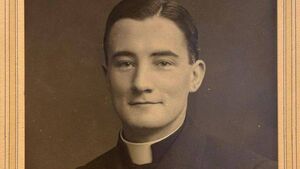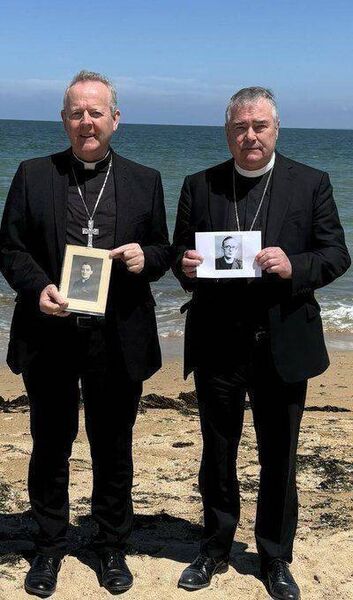Roscommon’s ‘the fighting padre’ honoured at D-Day commemorations

Fr. John Patrick (Jack) O’Brien SSC was born in County Roscommon in 1918.
A Roscommon priest and wartime chaplain was honoured for his bravery and commitment to the frontline troops at the recent D-Day commemorations.
Donamon man Fr John (Jack) Patrick O’Brien, affectionately known as ‘the fighting padre’ was, born on December 1st, 1918. He was the eldest of four to his parents, Thomas Joseph O’Brien, a station master and Mary Elizabeth Hegarty.
The nature of his father’s job meant Jack moved from school to school, attending national school in Killala and Ballinrobe before attending St. Nathy’s College where he completed his secondary education.
The former Saint Nathy’s student was ordained in 1942 for the Society of Saint Columban, but because of the wartime travel restrictions he was unable to receive a missionary placement. Instead, the young Father Jack decided to train as an army chaplain. He was assigned to the Royal Ulster Rifles, and to accompany the D-Day invasion, landing with the Allies on Sword Beach, eighty years ago.
A keen boxer in his youth, ‘the fighting padre’, as he became known to his troops, served his mission in the battlefields of Normandy, without a weapon as he was the army chaplain, adding to the danger of his mission, but not once did he refuse to offer Confession, the Eucharist and the Last Rites to anyone who asked.
A popular figure amongst troops because of his positive attitude and witty humour, Fr Jack was known to visit the men in their dugouts “for a few hands of poker, often with rum scrounged from the quartermaster”.
His commanding officer said of him: “(Jack’s) perennial cheerfulness was the salvation of many a drooping spirit in the difficult days which confronted us”.
Fr O’Brien’s missions did not end on the beaches of Normandy, he travelled with his battalion to guard the Suez Canal and made it to Palestine in 1946.
During the Korean War, he was captured by North Korean forces and imprisoned. He was then murdered with 1,000 other prisoners in a massacre in September 1950.
Speaking at an ecumenical service in Ranville, Normandy on June 7th, Archbishop Eamon Martin spoke of Father Jack’s Christian mission and bravery while serving with the Allies in World War II.
“I have brought with me today a photograph of Father John Patrick O’Brien SSC, a treasured possession of his relatives back in Ireland. Father John was born in Donamon, County Roscommon at the end of 1918, just a few weeks after the guns of the so-called ‘Great War’ fell silent,” Archbishop Martin said. “At the age of 17, Jack - as he was known to family and friends - left Saint Nathy’s College in Ballaghaderreen with a strong sense that God was calling him to be a missionary priest in the Far East.” Archbishop Martin had no doubt that Jack O’Brien would have been inspired as a young person by stories of fellow Irishman, Father Willie Doyle. Fr Doyle was a chaplain in the First World War who was killed by a German shell while running out to rescue two wounded soldiers in No Man’s Land in 1917.

“Many stories were told of Father Doyle’s bravery and deep faith, and how everybody in his battalion held him in great respect - Catholics and Protestants alike,” the Catholic Archbishop of Armagh said.
“For the newly ordained Father Jack O’Brien, the battlefields of Normandy and beyond were to become his first parish; his mission: ‘to give, and not to count the cost’; to serve God by keeping hope and human dignity alive amidst the horror and brutality of war.
“As a Catholic chaplain he offered the consolation of prayer and the sacraments to everyone who asked - especially Confession, the Eucharist and the Last Rites - and he never forgot a word of compassion and encouragement for the wounded, the worried and the war weary.
“The troops called him ‘the fighting padre’ because Jack had been a boxer in his student days, and several anecdotes are recorded of his positive attitude and good humour. They say he sometimes ‘visited the men in their dugouts for a few hands of poker, often with rum scrounged from the quartermaster,’ and once, when a newly arrived officer fainted and almost fell into an open grave during a burial, Father Jack grabbed him saying, ‘Now, there’s no need to be in a hurry. All in good time.’” Archbishop Martin said that it has been largely forgotten “perhaps conveniently at times” that tens of thousands of men and women from all over the island of Ireland served side by side during the Second World War.
“Unlike many others, they were volunteers, rather than conscripts - personally motivated to serve the cause of peace and freedom and justice.
“Within six to ten months of D-Day, the RUR Battalion had helped to liberate village after village across northern France, Belgium and Holland, at last reaching Bremen in Germany. At that stage Fr Jack wrote home saying that sadly not many of his original flock were left, but according to his commanding officer: ‘(Jack’s) perennial cheerfulness was the salvation of many a drooping spirit in the difficult days which confronted us’.
“After the German surrender, Father O’Brien’s kindly and cheerful presence continued to be a source of great comfort to the displaced and traumatised people they met along the way. Ever the missionary, he travelled on to Egypt, where the Battalion was helping to guard the Suez Canal, and by 1946 he was with them in Palestine - a long way from the beaches here where he had first landed.” In 1948 Fr Jack was assigned as a missionary priest in Mokpo, on the southern coast of South Korea.
“Father Jack O’Brien’s story of courage and self-denial continued well beyond D-Day. In 1950, when the communist forces began to invade South Korea and were approaching his parish, he refused an offer from American troops to be evacuated to safety, preferring instead to remain with his people and serve them to the end,” Archbishop Martin said.
“He was captured and imprisoned, and after a long march at gunpoint towards North Korea, he was executed in the massacre at Taejon, a month before his 32nd birthday. His body was never found or identified - he was martyred for his faith and belief that ‘neither death nor life can ever separate us from the love of God.’” As his address came to a close, the archbishop added that coincidentally Fr Jack's old comrades, the soldiers of the Royal Ulster Rifles 1st Division, suffered many losses in the Korean War.
“In 2013 a memorial stone was erected in Seoul to record and honour their contribution. Fittingly it includes the name of their former chaplain, one Father John Patrick (Jack) O’Brien who had served and prayed with them on these roads and fields of Normandy, 80 years ago today.” In his reflections, Archbishop Martin expressed his gratitude to Father Neil Collins SSC and to Mairead O’Brien for sharing with him the fruits of their research into the life of Father Jack O’Brien.






